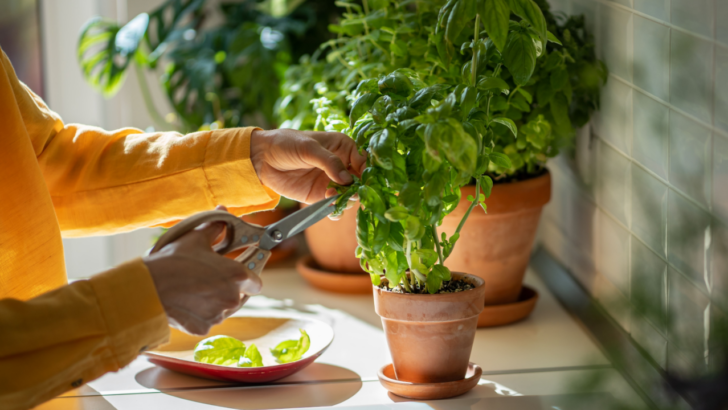Growing herbs is the easy part. The real magic is in the harvest. Most people use the “just cut and come again” harvesting method, and it’s no wonder some of the basil turns scraggly, thyme gets woody, and garlic chives give up on life.
But if you harvest with a little strategy, your herbs will bounce back like a mother who finally got 8 hours of sleep. These tips—pulled straight from a smart video by @epicgardening—will help you keep your herb garden thriving, tidy, and ready to refill your kitchen again and again.
1. Basil: Don’t Just Take—Shape It
If you cut basil the wrong way, it throws a fit and grows tall, leggy, and weak. Epic Gardening says the best way is to snip it smart, and it turns into a lush, bushy machine that pumps out leaves like it’s getting paid.
Find a stem with at least two sets of leaves. Snip right above a pair of those leaf nodes. When you take off the vertical height, the two leaves will expand to the right and the left, making it bushier.
Most people don’t want to wait until it flowers. Once it does, the flavor dips, and the plant shifts focus from leaf-making to seed-making. Nip those buds early if you want that rich basil punch in your pesto.
2. Thyme: Trace and Trim
Thyme might be tiny, but its stems root themselves as they spread, like it’s laying down Wi-Fi extenders across your soil. That means you can get more plants from a single runner if you harvest the right way.
Follow a stem all the way back to where it’s connected to the base. Cut a longer stem from low down, strip the leaves from the bottom few inches, and plant it right back into the soil. If you just keep trimming the tops, your plant gets woody and stiffer over time. Give it a solid haircut now and then to keep it soft, full, and generous.
3. Garlic Chives: Trim, Don’t Tug
With garlic chives, it’s best not to yank individual stalks like you’re picking scallions at the store. Grab some scissors and give it a haircut across the top, leaving about an inch or two above the soil.
This way, you leave the growing centers untouched, and the plant keeps producing. It also keeps your chives looking neat and dense, like a little green hedge that smells faintly of stir-fry.
4. Mint: Contain the Chaos
Mint spreads like gossip. If you’re growing it in a bed, good luck—it’ll take over faster than you can say mojito. Keep it in a pot, and harvest regularly by cutting stems just above a leaf pair. This keeps it bushy and stops it from going full jungle mode.
5. Parsley: Outer Leaves First
Parsley grows in a rosette, which means new growth comes from the center, not the stems you cut. Always cut the outer stems near the base. Taking from the middle is like pulling the engine out of a running car—it doesn’t end well.
6. Cilantro: Fast and Furious
Cilantro bolts faster than a track star in summer heat, you can expect a harvest in as little as 30 days after planting. Cut a third of the plant at a time and harvest often to slow it down. If it flowers, let it drop seeds—you’ll probably get a surprise second round without lifting a finger.
Final Harvesting Smarts
Use sharp scissors or pruners to make clean cuts. Tearing damages the plant. Morning is the best time to harvest—after dew dries but before the sun scorches. Oils and flavors are at their peak then. Cut, don’t strip. Ripping leaves off can stress or snap delicate stems. Don’t take more than a third of the plant at once unless you’re retiring it.
May your herbs stay productive and your scissors always sharp.


